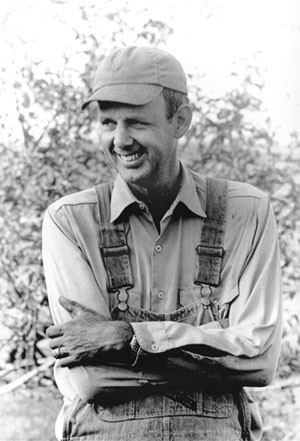“You’re free when you realize you’re willing to go to the length that’s necessary.” Wendell Berry – October, 2013

Various inspirations from a Bill Moyers interview with Wendell Berry. Broadcast on Oct. 4, 2013.
The Peace of Wild Things
Wendell Berry, “The Peace of Wild Things” from The Selected Poems of Wendell Berry. Copyright © 1998. Published and reprinted by arrangement with Counterpoint Press.
Snippets from the interview:
WENDELL BERRY: “We’ve acknowledged that the problems are big, now where’s the big solution? When you ask the question what is the big answer, then you’re implying that we can impose the answer. But that’s the problem we’re in to start with, we’ve tried to impose the answers.
The answers will come not from walking up to your farm and saying this is what I want and this is what I expect from you. You walk up and you say what do you need. And you commit yourself to say “all right, I’m not going to do any extensive damage here until I know what it is that you are asking of me.”
And this can’t be hurried.
This is the dreadful situation that young people are in. I think of them and I say well, the situation you’re in now is a situation that’s going to call for a lot of patience.
And to be patient in an emergency is a terrible trial”
…
BILL MOYERS: Do we have time given what agribusiness is doing?
WENDELL BERRY: We don’t have a right to ask that question. We have to ask what’s the right thing to do and go ahead and do it and take no thought for the morrow.
…
A Poem on Hope
It is hard to have hope.
It is harder as you grow old, for hope
must not depend on feeling good
and there’s the dream of loneliness at
absolute midnight.
You also have withdrawn belief
in the present reality of the future,
which surely will surprise us, and hope is harder
when it cannot come by prediction
anymore than by wishing.
But stop dithering. The young ask the old to hope.
What will you tell them? Tell them at least
what you say to yourself. Because
we have not made our lives to fit our places,
the forests are ruined, the fields, eroded,
the streams polluted, the mountains, overturned.
Hope then to belong to your place by your own knowledge
of what it is that no other place is,
and by your caring for it, as you care for no other place.
This knowledge cannot be taken from you by power or by wealth.
It will stop your ears to the powerful when they ask for your faith,
and to the wealthy when they ask for your land and your work.
Be still and listen
to the voices that belong to the stream banks and the trees
and the open fields. … Find your hope, then,
on the ground under your feet.
Your hope of Heaven, let it rest on the ground underfoot….
The world is no better than its places. Its places at last
are no better than their people while their people continue in them.
When the people make dark the light within them,
the world darkens.